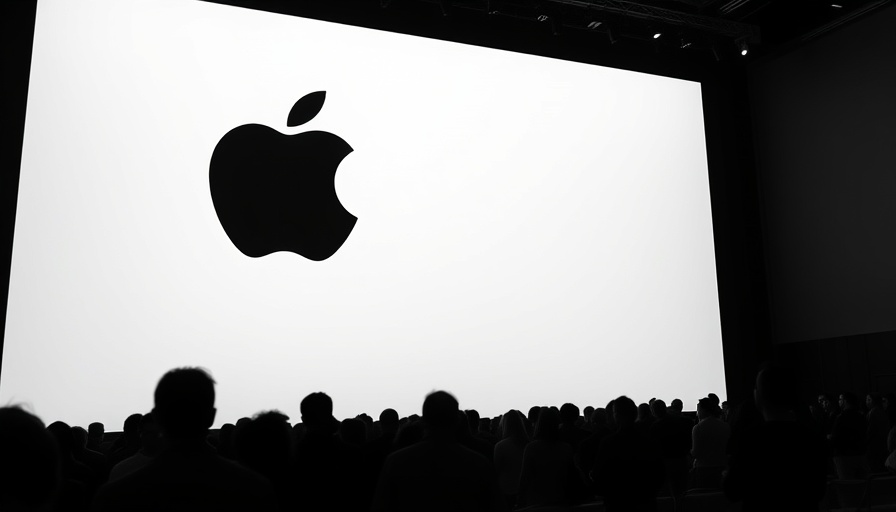
Apple's Game-Changer Moment Approaches
As we look forward to the annual Worldwide Developers Conference (WWDC), Apple stands at a critical juncture. With all eyes on CEO Tim Cook’s keynote address, the tech giant must deliver compelling updates regarding its future innovations, especially in artificial intelligence (AI). After last year’s ambitious introduction of Apple Intelligence, the pressure is on to showcase advancements that set it apart from industry rivals like Google and OpenAI.
The Year of Artificial Intelligence: What’s at Stake?
Last year, Apple unveiled its suite of AI-powered features aimed at enhancing its devices, primarily the iPhone. However, the journey since then has been rocky. The company struggled to effectively captivate consumers and investors, prompting questions about its leadership in a technology that is now a cornerstone for how we communicate and access information.
At WWDC this year, analysts expect Apple to paint a comprehensive vision of how AI will play a pivotal role in its ecosystem. Carolina Milanesi, president at Creative Strategies, emphasizes that this year’s WWDC is more crucial than previous ones. It’s an opportunity for Apple to outline not just upcoming features but also to reassure its audience of its capabilities in AI development.
Learning from Rivals: The Competitive Landscape
The stakes have never been higher as tech rivals push forward with groundbreaking AI innovations. Google and OpenAI are introducing tools that don't just inform users but also actively facilitate tasks. In comparison, Apple's current offerings are primarily enhancements to existing functionalities: summarizing emails, analyzing surroundings with iPhone cameras, and more. While these features are indeed useful, they lack the transformative qualities that have defined Apple's previous successes.
This raises an important question for Apple’s upcoming presentation: what unique experiences will Apple provide that are markedly different from those found in competing products? As the landscape evolves, the expectation for innovation continues to grow, and Apple must rise to the occasion.
The Perks of Patience: Apple’s Strategic Approach
Despite the pressures to deliver, Apple has a habit of outpacing its competitors by adopting a 'wait-and-see' approach. While this may lead to delays in product releases, it has also shielded the company from some of the blunders its competitors have faced in the AI space. By learning from their missteps, Apple can refine its offerings before rolling them out to the market.
For instance, the steady refinement of the iPhone and the eventual success of platforms like iOS demonstrate Apple’s strategy of popularizing technology rather than being the first to market. Products like the Apple Watch and AirPods are prime examples of how strategic timing and product enhancement can yield dominance in a competitive landscape.
The Anticipated Role of Apple Intelligence
As WWDC approaches, there is a considerable amount of anticipation regarding the role of Apple Intelligence in its updates. The company will likely showcase improvements to accessibility and personalization, providing a glimpse into how AI can improve user experiences significantly. These advancements are expected to enhance not just existing devices but set a benchmark in the AI marketplace.
The submission of Apple to the upcoming WWDC must include vivid demonstrations and use cases that exhibit the potential of Apple Intelligence to redefine how users interact with technology daily. This will not only attract consumers, but it will also restore confidence among investors regarding Apple’s competencies in the fast-evolving tech landscape.
What Lies Ahead: Consumer Expectations
As consumers increasingly rely on their devices for everyday tasks, expectations are changing. They are not merely seeking upgrades; they demand experiences that are intuitive, insightful, and beneficial to their lives. The road ahead is about more than just competition; it’s about contributing positively to everyday living through technology.
For Apple, establishing its position as a leader in AI is not just pivotal for its market share, but it’s also essential for shaping the future of user interaction with technology. WWDC 2025 could very well be the defining moment for Apple, marking its ability to adapt and lead in this new era of AI innovation.
As we await the announcements from the WWDC, it’s clear that many eyes will be on how Apple addresses the current climate of technological creativity and competition, signaling whether it is indeed a player to watch in the age of AI.
 Add Row
Add Row  Add
Add 




 Add Row
Add Row  Add
Add 

Write A Comment